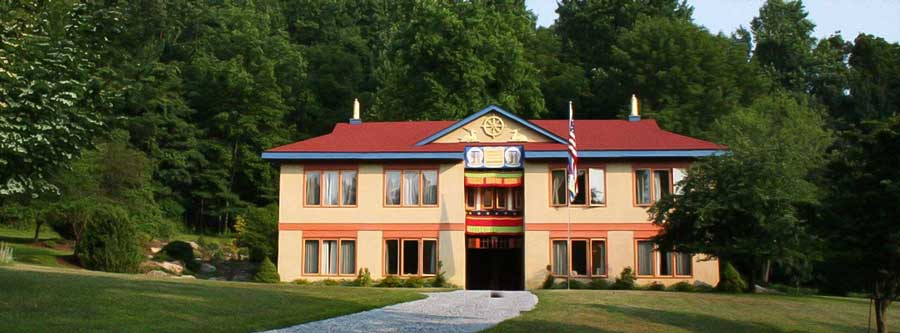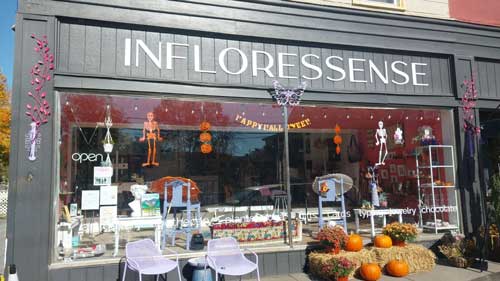
A long gravel path leads the way to the Tibetan Buddhist learning center on Montana Mountain in rural Washington Township in Warren County. One of the Skylands' most sublime settings, Labsum Shedrub Ling, as it's known in Tibetan language, is "a little special place that's open to the public", according to Diana Cutler, who, along with her husband Joshua, run the center. Buddhist contemplatives, the Cutlers open the center's doors the second and fourth Sundays of each month for a public prayer and meditation session in the temple followed by classes in Buddhist teachings.
The Tibetan Buddhist Learning Center (TBLC), Labsum Shedrub Ling, was founded through the great efforts of Geshe Wangyal, a Kalmyk-Mongolian lama who received his Buddhist training in Kalmykia and in Tibet. The center was founded in 1958. Over the years, Geshe-la took on Western students who had developed an interest in learning about Tibetan Buddhism. Before Geshe-la passed away on January 30, 1983, he appointed Joshua W. C. Cutler as director of the activities of the center. In the following year, His Holiness the Fourteenth Dalai Lama of Tibet, always revered by Geshe-la as the spiritual head of the center, advised that the English name be changed to the Tibetan Buddhist Learning Center to clearly reflect that its main activity is teaching Tibetan Buddhism.
In summer, winter, and spring, TBLC gives weekend seminars intended as intensive instructions on specific topics for beginners and advanced students alike. The primary aim: to develop a Buddhism that is culturally American and, at its heart, not different from the Buddhism that traveled from India through Tibet to TBLC's Tibetan monk-scholars and students in the United States. TBLC also has a limited number of resident students who study Tibetan language and Buddhist philosophy for extended periods of time. Living in this Buddhist contemplative community gives them a unique opportunity to apply the Buddhist teachings in a practical way. The Tibetan Buddhist Learning Center holds a weekly prayer and meditation session every Sunday beginning at 11 AM in the main temple followed by a class in the School House beginning at 1:30 pm-3 PM on Buddhist philosophy and meditation.
Understanding little about Buddhist philosophy, you don't know what to expect for a weekend seminar as you pass through the entranceway, an Asian arch hidden deep in the forest. Your anticipation heightens when you meet the staff here, especially the cheerful monks. Clothed in simple violet-saffron robes, you can't help notice their ways and mannerisms--bowing, hands held together as if praying, to you and the other students; helping to prepare (and clean up after) meals; smiling, sharing, speaking to anyone interested in listening at any time. Subtle leaders, they steer you toward "the true path", the final goal...enlightenment.
Enlightenment. Nirvana. Liberation from cyclic existence. Altruism. Noble truths. You hear these words throughout the seminar and you realize they're not just a new vocabulary for interested beginning Buddhists. "You could be the world's greatest scholar of Buddhism," one of the monks says, "but if you don't put these teachings into practice, they do no good."
Apparently, more and more of us want to do good. "More and more people are more aware of Buddhism nowadays," says Joshua Cutler, a soft-spoken man who also translates, with his wife, Buddhist texts from the Tibetan. "Back in the earlier years there weren't as many centers, books, teachers. Now there is much more information and they even have Buddhism on the internet and on computers."
The trees, the birds, the lotus plants in the spring and summer, the beautiful carp swimming in the nearby ponds, the meticulous gardens kept by the monks, the simple foods and the extraordinary comraderie. As Diana and Joshua like to say, "people who come here park the world at the door." "They come for the interaction with the monks. It's a little taste of Tibet," Diana concludes.
She's right. Most of all, you'll remember the monks. Quiet, reserved, simple beings the monks are happy people who care about others. "To truly serve others, we must first change ourselves," Geshe Tsetan instructs. "We must first realize we have problems and afflictions and then we must resolve to change them. Now that we've planted a seed in you, nurture it."
Contact: Joshua W.C. Cutler,
Executive Director
Tibetan Buddhist Learning Center
93 Angen Rd Washington, New Jersey 07882-4318
Phone: 908-689-6080
Website
Former/Other Names: Lamaist Buddhist Monastery of America, Labsum Shedrub
Ling
Visitors Welcome on Sundays during public programs
(TBLC is run only on donations, students are asked to pay a fee for
room and board and make a donation for classes. All work at the Center
is done on a
voluntary basis.)
The Centenary Stage Company produces professional equity theatre and also a wide variety of top-flight musical and dance events throughout the year.

A fine art gallery like no other! Unique, handmade gifts and cards as well as yoga, meditation, and continued learning lectures. Come in Saturdays for all-day open mic and Sundays to try unique nootropic chocolate or mushroom coffee. Browse the $5 books in the Believe Book Nook while you nibble and sip.
Local roots!
Consider Rutherfurd Hall as refuge and sanctuary in similar ways now, as it served a distinguished family a hundred years ago.
The 8,461 acre park includes the 2500-acre Deer Lake Park, Waterloo Village, mountain bike and horseback trails.